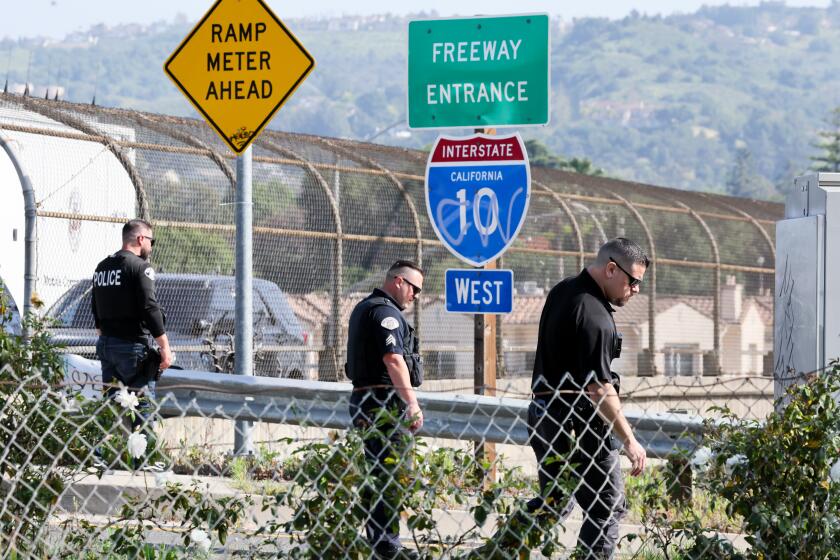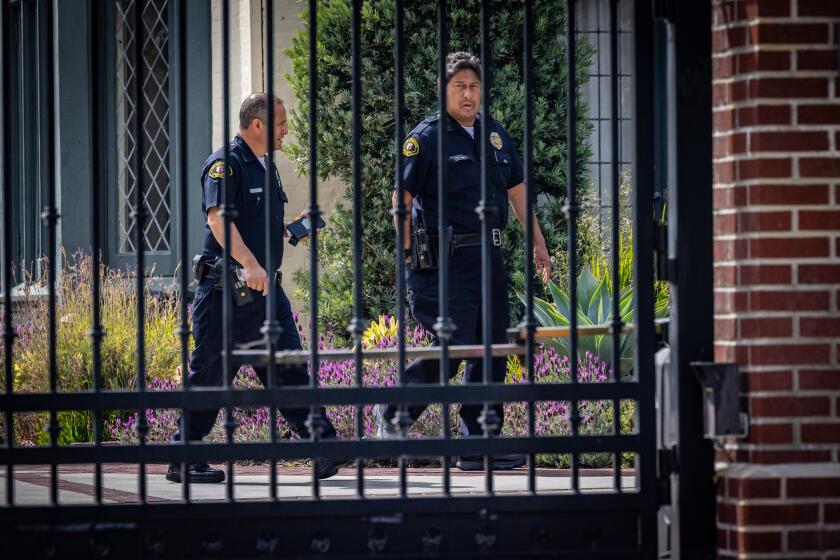S.F. Prosecutor’s Case Puts Career on the Line
Dist. Atty. Terrence Hallinan, a former amateur boxer nicknamed Kayo, landed the first blow in the fight of his life last week.
In a bold gambit that decimated his already rocky relationship with the city’s Police Department, the 66-year-old prosecutor directed a grand jury that indicted Police Chief Earl Sanders and three of the chief’s top commanders.
Hallinan scheduled a news conference today and is expected to discuss for the first time the case against Sanders, the aides and six other officers, who are alleged to have conspired to obstruct justice in a cover-up of a street brawl involving three off-duty officers, including the son of an assistant police chief.
The district attorney said in an interview with The Times that he had been “surprised” by the grand jury’s decision to include the Police Department’s top brass in the indictments.
But lawyers familiar with the grand jury system said Sunday that it is highly unlikely that a grand jury would have returned charges that had not been sought by prosecutors.
“Prosecutors do not come back with indictments unless they ask for them,” said Peter Keane, dean of Golden Gate University Law School and a former longtime public defender here.
“It’s like pushing someone off the roof and saying, ‘It’s not my fault he fell to the ground. Gravity did it.’ ”
Hallinan insists he will not back down, despite criticism that he overreached as part of a political maneuver to further his November reelection efforts.
“Can we move to dismiss some of those charges?” he asked. Could prosecutors examine the grand jury transcripts “and say, ‘Well, we give up on that’? That’s not my nature.”
The move could threaten Hallinan’s political career.
“If this backfires, if this case falls apart ... he is finished,” said Jeff Brown, who was the city’s public defender for 22 years. “Even if he dumps these indictments wholesale, he is through.”
The indictments strike a blow, not only at the city’s 2,300-member police force, with whom Hallinan’s office must work to exact justice, but at Mayor Willie Brown, a political foe who appointed Sanders as chief only a few months ago.
After hearing an appeal Friday night by the mayor, who asked that Sanders remain on the job, the Police Commission will meet today to consider whether the chief and the others should temporarily step aside while the case unfolds. Reached Sunday, one commissioner said the panel would probably remain “united in support of the chief,” unless new evidence surfaces.
The commissioner, who spoke on the condition of anonymity, said the five-member panel was miffed that it had not yet received copies of the sealed indictments against the officers.
Since the charges were announced Friday, Hallinan has avoided the spotlight. But he told The Times that he stood by his handling of the case, and pledged that, once the grand jury transcripts are made public, “everyone will understand what happened.”
Hallinan also said he believed that the mayor had not taken seriously an alleged police cover-up that he likened to Watergate. The mayor, he said, thinks the case “has something to do with his dislike for me. This has nothing to do with that.”
Hallinan said he had sought the grand jury investigation because he had not been getting adequate cooperation from the Police Department.
“There was no question” there was a cover-up, he said. “That’s why we went to the grand jury.”
However, Hallinan said he had been surprised that the indictments reached all the way to the police chief. “They didn’t go out independently and investigate, but they didn’t just take what we suggested to them,” the prosecutor said.
In the interview, Hallinan suggested that the more the grand jury looked at the evidence, the more wrongdoing its members found. He described it as concluding: “ ‘We think there’s something more important here. We’re not going to let this get away.’ ”
Hallinan insisted that, although he had attended the grand jury hearings, he had not been present during part of testimony given by a police investigator, who previously alleged publicly that the department had impeded his probe of the brawl.
Local legal experts who have known Hallinan for years said that prosecutors exercise so much influence and control over grand jurors that the outcome of their deliberations is rarely a surprise.
Joe Freitas, a labor arbitrator and former district attorney, said he has never heard of a grand jury’s issuing indictments that the prosecutor had not sought.
“The district attorney in charge asks questions and often gives leave to grand jurors to ask questions,” he said. “Usually, the district attorney prepares the charges, based on the law.”
Some said Hallinan may be trying to deflect criticism from himself if the charges do not hold up. “If the case fizzles, he can say, ‘The grand jurors came back and all I did was prosecute it,’ ” said Brown, the former public defender. “That is disingenuous.”
If Hallinan thinks that any of the charges are unfounded, Brown said, he has the obligation to pare those out of the indictment. “Knowing him, in for a penny, in for a pound, I think he’s kind of getting a kick out of the fact that Willie Brown’s appointees are in a major position of embarrassment,” Jeff Brown said.
Hallinan, the son of a criminal defense attorney, has alienated many with his impetuous and combative style. He once got into a fistfight with a former supporter inside a crowded steakhouse after Hallinan fired several veteran prosecutors by leaving pink slips on their chairs during lunch hour.
As for the prosecutor’s relationship with police, “He decided to go against the very Police Department he works with daily,” said city Public Defender Jeff Adachi.
Keane, the dean of Golden Gate University Law School, agreed.
“The first rule of any kind of efficient criminal justice system is total trust between prosecutors and police,” he said. “So this clearly is something so explosive that it dynamites that cooperation.”
*
Reiterman and Glionna are Times staff writers. Pogash is a freelance correspondent.
More to Read
Start your day right
Sign up for Essential California for news, features and recommendations from the L.A. Times and beyond in your inbox six days a week.
You may occasionally receive promotional content from the Los Angeles Times.







